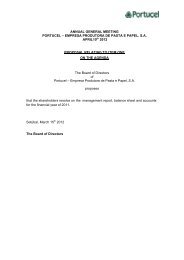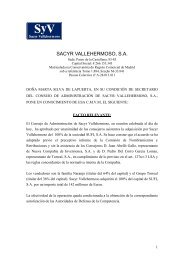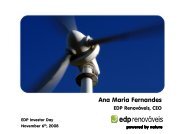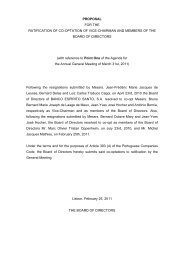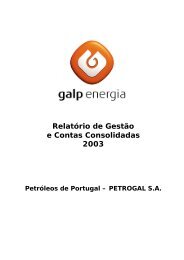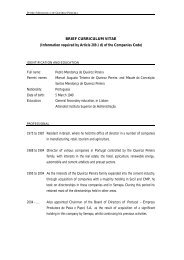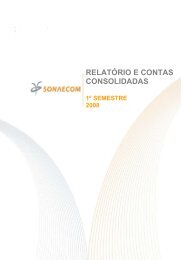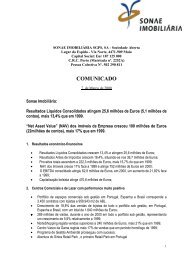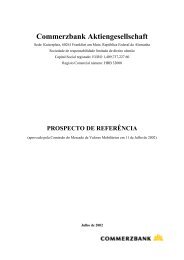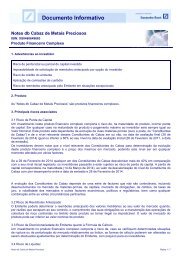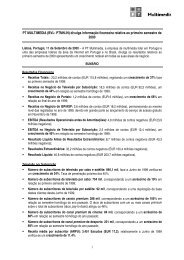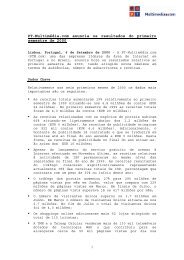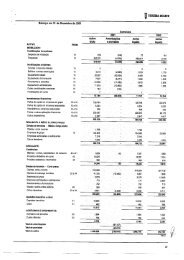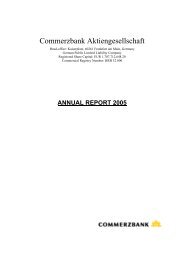edp – energias de portugal, sa edp finance bv €12500000000 - CMVM
edp – energias de portugal, sa edp finance bv €12500000000 - CMVM
edp – energias de portugal, sa edp finance bv €12500000000 - CMVM
Create successful ePaper yourself
Turn your PDF publications into a flip-book with our unique Google optimized e-Paper software.
EDP for its actual or anticipated loss and the loss of any of these assets may adversely affect EDP’s business,<br />
financial condition, prospects and results of operations. Moreover, the expiration or termination of<br />
concessions, licences or permits might limit EDP’s ability to renew such concessions, licenses or permits and/or<br />
to further conduct its business in an entire jurisdiction and, consequently, could have a material adverse effect<br />
on EDP’s business, financial condition, prospects or results of operations.<br />
EDP’s businesses are subject to and constrained by environmental, health and <strong>sa</strong>fety laws and regulations.<br />
EDP’s businesses are subject to numerous environmental regulations that could have a material adverse<br />
effect on its business, financial condition, prospects or results of operations. These inclu<strong>de</strong> national, regional<br />
and local laws and regulations of the different countries in which EDP operates, as well as supra-national laws,<br />
particularly EU regulations and directives and international environmental agreements. More restrictive or less<br />
favourable regulations, or the stricter interpretation of current regulations, such as an obligation to modify<br />
existing power plants and associated facilities or the implementation of additional inspection, monitoring,<br />
clean up or remediation procedures, could lead to changes in EDP’s operating conditions that might require<br />
additional capital expenditures, increase its operating costs or otherwise hin<strong>de</strong>r the <strong>de</strong>velopment of its<br />
business. Environmental regulations affecting EDP’s business primarily relate to air emissions, water pollution,<br />
waste dispo<strong>sa</strong>l and electromagnetic fields.<br />
EDP’s thermal electricity generation operations, particularly coal-based power plants, are significantly<br />
affected/regulated by legislation aimed at reducing CO2 emissions. Currently, installations located within the<br />
European Union receive from Member States an initial free allocation of CO2 allowances (European Union<br />
Allowances (EUAs)). EDP expects to receive, in the 2008-2012 period, free allowances from the Portuguese and<br />
Spanish governments amounting to approximately 77 metric tons of CO2. This volume of EUAs, with the<br />
purchase of additional allowances and other carbon credits such as Certified Emission Reductions (CERs) and<br />
Emission Reduction Units (ERUs), are expected to cover EDP’s emissions fully for this period. From 2013<br />
onwards, emissions allowances for the power sector are expected to be 100 per cent. auctioned. EDP’s<br />
thermal plants in Portugal which are subject to CMEC legislation have the right to allocate costs of CO2<br />
emissions into the system tariff until the original date of termination of the Power Purchasing Agreement (PPA)<br />
concerning each plant, which will be at the end of 2017 in the case of EDP’s main coal-based power plant at<br />
Sines.<br />
Although EDP’s past and planned future investments in new generation facilities assume that there will<br />
be no CO2-free allowances from 2013 onwards and that such allowances will be even more restricted over<br />
time, EDP continues to operate according to its current CO2 risk management practices and to the existing<br />
legislation and regulations regarding these emissions. There can be no assurance that EDP will manage its CO2<br />
emissions within the applicable allowances nor that there will be no changes in current laws, regulations and<br />
targets which might adversely affect EDP’s business, financial conditions, prospects and results of operations.<br />
Apart from CO2, the major waste products of electricity generation using fossil fuels are sulphur dioxi<strong>de</strong>,<br />
nitrogen oxi<strong>de</strong>, and particulate matter, such as dust and ash. A primary focus of the environmental regulations<br />
applicable to EDP’s business is to reduce these emissions, and EDP may have to incur significant costs to<br />
comply with environmental regulations which require the implementation of preventative or remediation<br />
measures. Environmental regulation may inclu<strong>de</strong> emission limits, cap-and-tra<strong>de</strong> mechanisms, taxes or<br />
remediation measures, among others, and may <strong>de</strong>termine EDP’s policies in ways that affect its business<br />
<strong>de</strong>cisions and strategy, notably discouraging the use of certain fuels.<br />
The EU Large Combustion Plant (LCP) Directive (the “LCP Directive) regulates industrial pollution and aims<br />
to reduce emissions of acidifying pollutants, particles, and ozone precursors. The LCP Directive entered into<br />
force on 27 November 2001 and it replaced the old Directive on large combustion plants (Directive 88/609/EEC<br />
as amen<strong>de</strong>d by Directive 94/66/EC). The LCP Directive encourages the combined generation of heat and power<br />
and sets specific emission limit values for the use of biomass as fuel. It also inclu<strong>de</strong>s certain gas turbines in its<br />
scope in or<strong>de</strong>r to regulate NOX emissions, and has set limits for sulphur dioxi<strong>de</strong>, nitrogen oxi<strong>de</strong> and dust in<br />
effect since 1 January 2008. The main strategy adopted by EDP to comply with the LCP Directive and with<br />
applicable national law (notably with Decree-Law 178/2003, of 5 August which transposes into national law the<br />
<strong>sa</strong>id Directive) involved installing <strong>de</strong>sulphuri<strong>sa</strong>tion and <strong>de</strong>nitrification systems in its most efficient coal plants.<br />
After a two-year review process, the European Commission adopted on 21 December 2007 a propo<strong>sa</strong>l for<br />
a Directive on industrial emissions to minimise pollution from various industrial sources throughout the<br />
European Union (the “IPPC Directive”). The Propo<strong>sa</strong>l recasts seven existing Directives related to industrial<br />
emissions into a single clear and coherent legislative instrument. The recast inclu<strong>de</strong>s the then-existing Directive<br />
14



